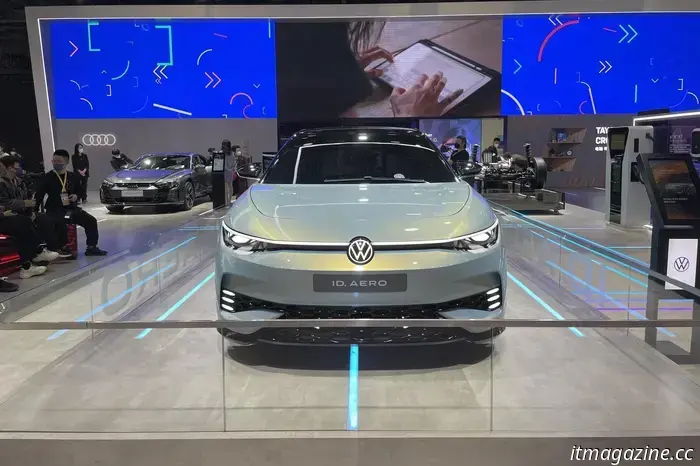
According to AlixPartners, global automakers need to be adaptable in China over the next five years.
Volkswagen unveiled its latest electric sedan, the ID.Aero, during the China International Import Expo (CIIE) in Shanghai on November 6, 2022. Credit: Jill Shen/TechNode
Experts from AlixPartners stated on July 4 that foreign automakers must adopt "agility" in their vehicle development processes to meet the growing demand for in-car technologies from Chinese consumers, in order to halt their declining market share in this highly competitive environment. Stephen Dyer, Asia Leader of the Automotive and Industrial Practice at AlixPartners, expressed to reporters in Shanghai (translated) that this will be essential for remaining relevant in the market over the next five years.
International brands are losing ground in China, with the consultancy predicting their market share will drop from 33% this year to just 24% by the end of the decade, as domestic competitors are expected to dominate the majority. BYD chairman Wang Chuanfu has a more optimistic projection, stating last year that he anticipates foreign brands will only represent 10% of the Chinese market within three to five years, as reported by Reuters.
Chinese consumers once had limited options, but now they can choose from numerous tech-rich offerings. Dyer emphasized that the primary concern is whether global companies can truly understand and keep pace with market trends. Their priorities should focus on establishing efficient software workflows, developing next-generation electric vehicles based on standardized electrical architecture, and leveraging China's tech ecosystems for vehicle connectivity.
The comments came as the global automotive industry faces a transformative period, impacted by trade and geopolitical tensions and experiencing short-term fluctuations in global electric vehicle demand. AlixPartners described the years from 2025 to 2029 as the "Age of Agility" in their annual global automotive outlook report, stating that agility has become a necessity and will distinguish the successful from the unsuccessful.
International automakers are confronted with a more intricate market landscape in China, characterized by the rise of local brands, increasing pressure from price reductions, and stricter regulatory measures. Chinese brands are setting new global standards with their quick-to-market approach, as it typically takes only 20 months for a Chinese electric vehicle startup to introduce a new model, which is twice as fast as global original equipment manufacturers (OEMs), according to AlixPartners' recent analysis.
This advantage stems from a clear emphasis on speed rather than perfection. Dyer noted that a key takeaway from China's "new operational model" is a greater willingness to take risks. Chinese firms often begin designing automotive and component molds even before finishing the testing and validation for a new vehicle. In addition, many are separating hardware and software development, greatly enhancing development efficiency.
These practices illustrate a clear shift towards vehicles resembling smartphones on wheels. The consultancy pointed out that fixed launch timelines take precedence over all other factors in the age of agility. "If you claim to be more technologically advanced than competitors, you must rapidly update your product line," added Dyer.
Jill Shen is a technology reporter based in Shanghai, covering topics related to Chinese mobility, autonomous vehicles, and electric cars. You can connect with her via email at [email protected] or on Twitter @jill_shen_sh.


Other articles
According to AlixPartners, global automakers need to be adaptable in China over the next five years.
BYD chairman Wang Chuanfu anticipates that foreign brands will represent just 10% of the Chinese market within the next three to five years.
